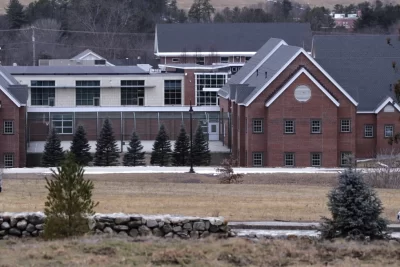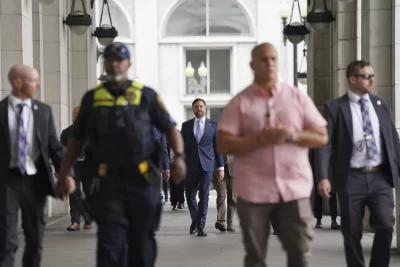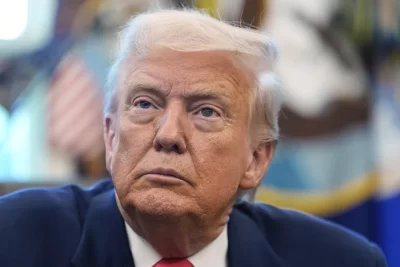
DEARBORN, Mich. — Bowls of labneh and platters of za’atar bread covered the tables in a Lebanese restaurant near Detroit, yet no one seemed to have much of an appetite.
On one side were Kamala Harris ’ top emissaries to the Arab American community. On the other were local leaders who were explaining — once again — why many in the community couldn’t vote for the vice president because of the war in Gaza.
“I love this country, but I’ll tell you, we have never been so disappointed in this country as we are now,” said Nabih H. Ayad, chairman of the Arab American Civil Rights League. “We wanted to give the Democratic Party the opportunity to do something, and they haven’t.”
“The one line we can’t cross,” Ayad said, “is genocide.”
Nasrina Bargzie and Brenda Abdelal, who were hired by Harris’ campaign to spearhead Arab and Muslim outreach, listened intently but said little in response.
If Harris loses Michigan and the presidential election next week, it’s conversations like this one that could explain why. The Detroit area has the country’s largest concentration of Arab Americans, and Democrats fear that Harris will pay a steep political price for U.S. support for Israel, which rejects allegations that its military operations in Gaza constitute a genocide.
Community members who normally back Democrats said they face an impossible decision. Either they punish Harris for what they view as complicity in the deaths of at least 43,000 Palestinians, according to Gaza’s Health Ministry, or they endure Donald Trump ‘s return to the White House, which they fear would revive discrimination toward their community.
A reminder of the situation’s complexity came in Ann Arbor on Monday night, when Harris held a campaign rally. Assad Turfe, one of the few Arab American elected officials in Michigan to endorse the vice president, said his community needs someone “who sees us, who understands us and who will give voice to our pain,” adding that “without a doubt that Kamala Harris is that leader.”
But as Harris began her remarks, pro-Palestinian protesters interrupted by chanting, “Israel bombs, Kamala pays, how many kids have you killed today?” Harris responded, “hey guys, I hear you” and “we all want this war to end as soon as possible.”
It’s unclear how many skeptics Harris will be able to win over, especially since she has not proposed any concrete changes on U.S. policy toward Israel or the war in Gaza. Four years ago, Joe Biden won by a 3-to-1 margin in Dearborn, where nearly half of the 110,000 residents are of Arab descent. Now Democrats are concerned some of these voters will go to Trump or third-party candidates like Jill Stein.
“They’re split. There are those who will vote for Harris, recognizing that they could get a seat at the table,” said U.S. Rep. Ro Khanna, D-Calif., who convened the recent meeting at the Lebanese restaurant in his efforts to help the Harris campaign. “But there’s a chunk that will vote for Stein or stay at home. Then there’s a minority who will vote for Trump.”
Trump has secured a number of endorsements from Muslims in the area, including from two Democratic mayors who represent Muslim-majority cities outside Detroit. He brought several Muslims on stage at a rally in metro Detroit on Saturday.
He argues he will put “a stop to the endless wars” and notes the Abraham Accords that Israel signed with several Arab nations during his presidency. He has also mocked Harris’ embrace of former Rep. Liz Cheney, a conservative Republican whose father, former Vice President Dick Cheney, was a key force behind the U.S. invasion of Iraq. Harris is campaigning with Liz Cheney to try to pull away moderate Republicans turned off by Trump in Michigan and elsewhere.
But many top Arab American leaders — even those who have not endorsed Harris — are still deeply negative toward Trump and say his endorsements don’t reflect a majority of the community. They also remember his call for a “total and complete shutdown” on Muslims entering the country and his travel restrictions on visitors from Muslim-majority countries. And some point out that Trump has suggested that he would give Israel even more leeway to attack its rivals in the region.
Harris wins over someone who backed the ‘uncommitted’ movement
Turfe, a Lebanese American and the deputy executive of Wayne County, is among the few Arab American leaders in Michigan to have endorsed Harris. He says it’s to ensure the community doesn’t return to a Trump presidency that “opened up old wounds for the generation that lived through those post 9/11 years.”
Turfe said he was jolted awake by immigration agents in 2005 when they came to detain his wife, who had come to the country when she was 2 years old and was unaware that she didn’t have legal citizenship.
“They came for her and they ripped my family apart,” he said.
Then in 2006, Turfe’s two grandmothers were killed in Lebanon as Israel fought with Hezbollah in a war backed by President George W. Bush.




